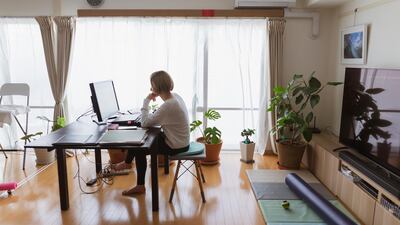People working from home are falling through the regulatory cracks, a new International Labour Organisation report says.
The report gives examples of low and middle-income countries, where 90 per cent of home-based workers are in informal positions.
They are usually worse off than those who work outside the home, even in higher-skilled professions, says the report, Working from Home. From Invisibility to Decent Work.
Home workers earn on average 13 per cent less in the UK, 22 per cent less in the US, 25 per cent less in South Africa and about 50 per cent in Argentina, India and Mexico.
They also face greater health and safety risks, and have less access to training than those in formal workplaces, which can affect their career prospects.
Home workers also lack the same level of social protection as other workers and are also less likely to be part of a trade union or covered by a collective bargaining agreement.
The ILO estimates there were about 260 million home-based workers worldwide before the coronavirus pandemic, 56 per cent (147 million) of whom were women.
This equated to 7.9 per cent of global employment.
In the first months of the pandemic, an estimated 20 per cent were working from home.
Data for the whole of 2020 is expected to show a substantial increase on previous years.
The report suggests that the growth of home working is likely to continue in the coming years, bringing with it regulatory problems that need to be addressed.
Regulating the home office
Home working is often poorly regulated and compliance with existing laws remains a challenge.
The workers are frequently classified as independent contractors and therefore excluded from labour laws.
“Many countries around the world have legislation, sometimes complemented by collective agreements, that addresses various decent work deficits associated with home work," said Janine Berg, ILO senior economist and one of the report’s authors.
"Nonetheless, only 10 ILO member states have ratified Convention No 177 , which promotes equality of treatment between home workers and other wage earners, and few have a comprehensive policy on home work."
Report's recommendations for home working
The report includes concrete recommendations to make home working more visible and thus better protected.
For industrial home workers, the report stresses the importance of helping their transition to the formal economy by providing legal protection, improving compliance, generalising written contracts, access to social security, and making them aware of their rights.
Regulating home-based, digital platform workers is harder because of the jurisdictional challenges of transnational work.
The report advocates the use of work-generated data to set fair wages.
For teleworkers, the report calls on policymakers to put in place action to lessen psycho-social risks and to introduce a "right to disconnect", to ensure respect for the boundaries between working life and private life.
The report also emphasises the importance of cross-border governmental collaboration.

